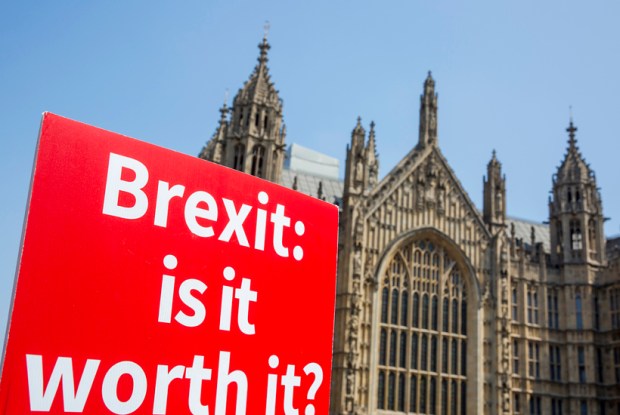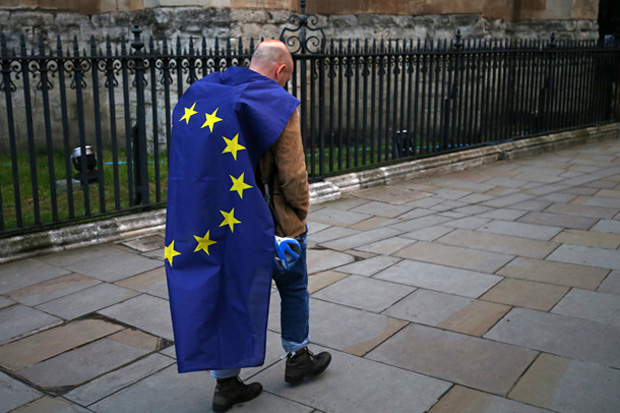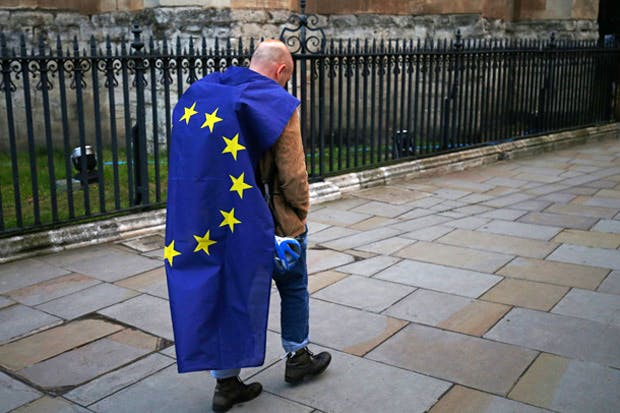‘Brexit,’ says my friend David Aaronovitch, ‘is dying.’ We Remainer irreconcilables certainly hope so. But there’s a slim chance the grisly Brexit project could yet pull through, and it’s right to acknowledge this. So in a spirit of candid friendship I write this letter to die-hard Leavers, of whom a small — but vigorous — colony survives on these Spectator pages…
Dear Leavebugs, You know I am not of your number, but I understand you. I even feel for you. The Leave/Remain split is not a divide between two halves of the British population, but a war within the breast of each person. Every feeling you’ve had, I’ve experienced too. Civil wars are always bitter; wars within ourselves the most bitter of all.
As an understanding friend, therefore, though never an ally, I write to warn you that your project is in deep trouble.
I know what you really want. You just want Britain out of any entanglement that spans the English Channel. For you this is as much an emotional longing as a practical calculation — an antipathy whose roots go deep, back to the first and second world wars, to the Napoleonic wars, to England’s fear of the French Revolution; back (though some of you may disown this root) to Protestant England’s detestation of Rome.
Be honest with yourselves. Though you’re ready to assert the material benefits you say could flow from leaving Europe, you know in your heart that such calculations are secondary and speculative. They are not what drive you, but a posteriori arguments for an impulse that came, first, from your heart: an impulse that would survive the demolition of any argument of economic advantage. Admit it. For you this isn’t about money.
Shut your eyes and make a supreme effort to confess your inner motivation. What is your immediate, instinctive, unguarded answer to the question: ‘What if Brexit made us poorer?’ You know, don’t you?
You’d be disappointed, of course, and sorry. Impoverishment isn’t what you expect. But you’d still think it was right to leave. Your reasons are almost spiritual. They relate to our whole identity as a people; our nation’s soul; our place in history. They do not (you believe) sit easily on any spreadsheet of material gains or losses, but are about destiny. Perhaps only secretly you could contemplate the idea of being poorer yet prouder: of exchanging a bit of take-home pay for that greater prize: independence and national self-respect. You find haggling about GDP, chlorinated chicken and Toyota’s tariffs beneath the argument.
I, too, am conscious of those feelings within myself. But we have to remind ourselves there was never a majority, never will be a majority, and was certainly no majority at the European referendum last year, for impoverishing ourselves in pursuit of national self-respect. You know very well that it was fear of such an eventuality that you needed to dispel during your Leave campaign. Hence that ‘£350 million for the NHS’ you always knew was offside but dared not repudiate. You know you could not have won without such reassurances.
That reassurance has been shattered. Voters have understood we’ll take a hit. Few now believe we’ll be richer. People are coming to fear we would be poorer. You do surely know this is the way the mood is turning. You know, too, how the same mood is growing within the Lords and Commons. You may think this faintheartedness is misplaced, but you cannot think it is temporary.
And you know MPs run with the breeze. Can you still believe the ‘hard’ Brexit you favour, requiring Britain’s departure from the single market and the customs union, will ever get through this parliament, still less a new one under a new government? Your version of Brexit will either break or be broken by government.
This leaves you with two alternatives. The first is to settle (as you’d see it) for half a loaf, and reconcile yourselves to a ‘soft’ Brexit, with concessions to the EU on the European Court of Justice, on immigration and on the right to make our own trade deals.
To do this, though, brings a terrible risk for you: one I’ve have warned about ever since the referendum. This ‘soft’ Brexit on which you might fall back is essentially the ‘Norwegian option’. But you Leavers and we Remainers argued so powerfully during the campaign that we couldn’t see how being rule-takers but no longer rule-makers was better than staying a member. That led you to say ‘right out’ and us to say ‘stay in’.
Wisely, you Brexiteers dropped the Norway idea. Now we Remainers are reviving it. Beware. Ask yourselves why. Beware, too, Remainers bearing ‘transitional arrangements’ for the single market, customs union, and jurisdiction of the ECJ. Suspect a plot by my lot to procrastinate until you lot slip out of vogue. Deadlines for any ‘transition’ can be put back until kingdom come. Allow us to lure you into these thickets, and you lose.
Your other alternative is bolder. Cheat Parliament of its chance to vote down a deal by never reaching one. Keep your hostage in Downing Street and storm on towards the cliff edge in which we tumble out of the EU without agreement. Persuade public opinion that Brussels bullies brought us to this breakdown, negotiation is now impossible, and Britain must walk away — and damn the consequences.
Damning the consequences is all that’s open to you now. Double or quits: a reckless strategy that could destroy the Conservative party and land you in the rogues’ gallery of history, but it’s your only hope. You speak for millions, but unfortunately not tens of millions. Good luck Charles; good luck, James F and James D; good luck Freddy, Rod, Dominic, Douglas. The way things are going it’s double or quits for all of you. We who are not about to die, salute you.
As ever, Matthew.
Got something to add? Join the discussion and comment below.
Get 10 issues for just $10
Subscribe to The Spectator Australia today for the next 10 magazine issues, plus full online access, for just $10.
You might disagree with half of it, but you’ll enjoy reading all of it. Try your first month for free, then just $2 a week for the remainder of your first year.















Comments
Don't miss out
Join the conversation with other Spectator Australia readers. Subscribe to leave a comment.
SUBSCRIBEAlready a subscriber? Log in